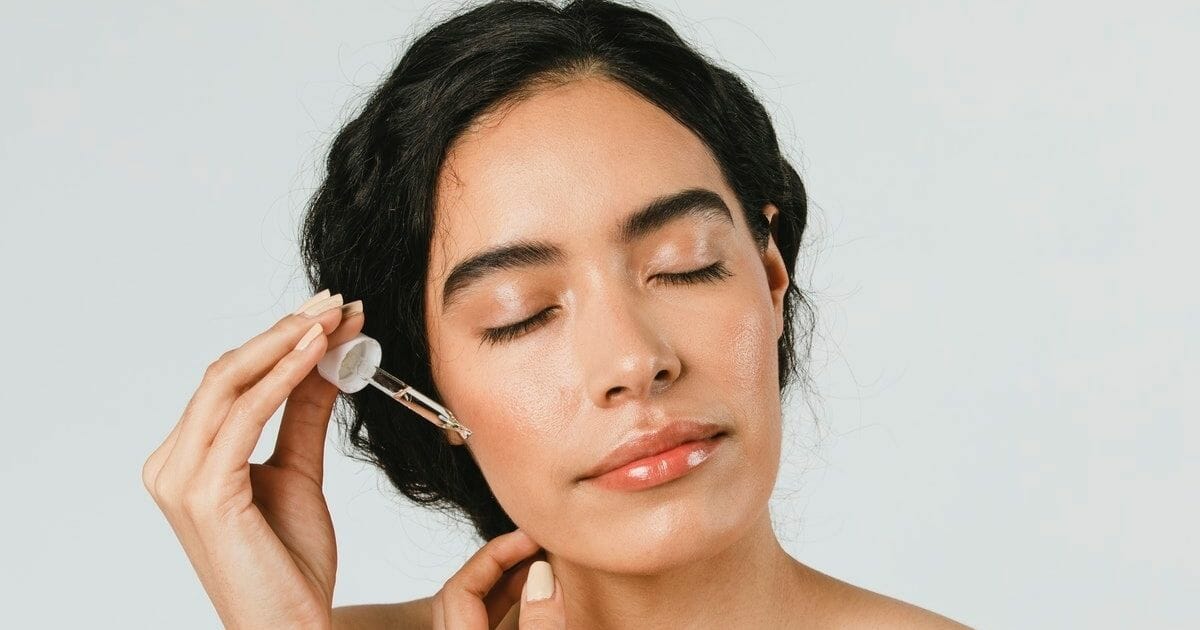The benefits of niacinamide in skincare are truly too good to pass up. Many foods contain niacinamide, including meat, fish, milk, green vegetables, avocados, and cereal grains. Along with its good friend’s biotin and folic acid, it’s found in many vitamin B complex pills.
Niacinamide is included in a variety of skincare products, including sunscreen, lotions, and face serums. This is due to its remarkable abilities to even texture, brighten and fortify skin, and reduce dullness. It’s basically a skincare saint!
Below are 7 main benefits of niacinamide and the reasons to include it in your daily skincare routine.
1. Improve skin tone
While vitamin C is typically considered the gold standard for brightening your skin, niacinamide is also a good option. Both these ingredients help achieve the same effect but in various ways. Vitamin C inhibits the overproduction of pigment, while niacinamide prevents the pigment from being transferred from melanin-producing cells to your skin cells. So, which should you choose? Both substances are vital for uneven skin correction and can work well together.
2. Improves skin barrier
Niacinamide is a water-soluble vitamin that helps to enhance the appearance and health of your skin by interacting with the natural components in your skin. Because of its capacity to enhance the skin’s barrier, niacinamide decreases the effect of environmental damage and also aids in the restoration of symptoms of previous damage. Niacinamide can help to improve your skin barrier, which is beneficial if you have dryness, sensitivity, or inflammatory skin disorders.
3. Helps regulate sebum
Niacinamide’s capacity to control oil (sebum) production is one of its biggest assets. It can drastically lower casual sebum levels in as little as two to four weeks of use. Rather than reducing oil production, several skincare products are designed to absorb it. Niacinamide helps people with oily skin not only reduce shine from excess sebum, but also the clogged pores that come with it.
4. Reduces breakouts
It’s obvious that niacinamide helps with acne because excess oil production is a significant cause of outbreaks. Over the course of eight weeks, using a 4% niacinamide gel can help reduce the number of pustules, comedones, and papules. These are inflammatory lesions, not cystic acne, and should not be mistaken for cystic acne. Niacinamide has been shown in several trials to be both safe and helpful in the treatment of mild to moderate breakouts.
5. Reduces signs of aging
If you are concerned about aging signs, niacinamide might give your skin the renewing boost it needs. It helps to prevent collagen protein glycation, a natural aging process that causes collagen fibers to become stiffer. The regular use of niacinamide can help reduce fine lines, wrinkles, skin laxity, and bounce. If you aren’t sure about the concentration of niacinamide you need, consult a dermatologist who can help you choose the right skincare products.
6. Reduces the appearance of pores
Can you actually shrink the size of your pores, or merely reduce their appearance? Depending on who you ask. But in any case, excess sebum production is linked to increased pore size. Niacinamide aids in the regulation of sebum production. So niacinamide has a favorable effect on the appearance of pore size. As a result, it’s a crucial element for anyone trying to acquire the appearance of poreless glass skin.
7. Combats dryness
If you have dry skin, topical niacinamide has been found to improve the hydrating effectiveness of moisturizers, allowing the skin’s surface to better withstand moisture loss, which causes dry, tight, flaky skin. Niacinamide also aids in the creation of ceramides, a kind of lipid that acts as a natural moisturizer for the skin. Glycerin, non-fragrant plant oils, cholesterol, sodium PCA, and sodium hyaluronate are all excellent partners for niacinamide in moisturizers.


